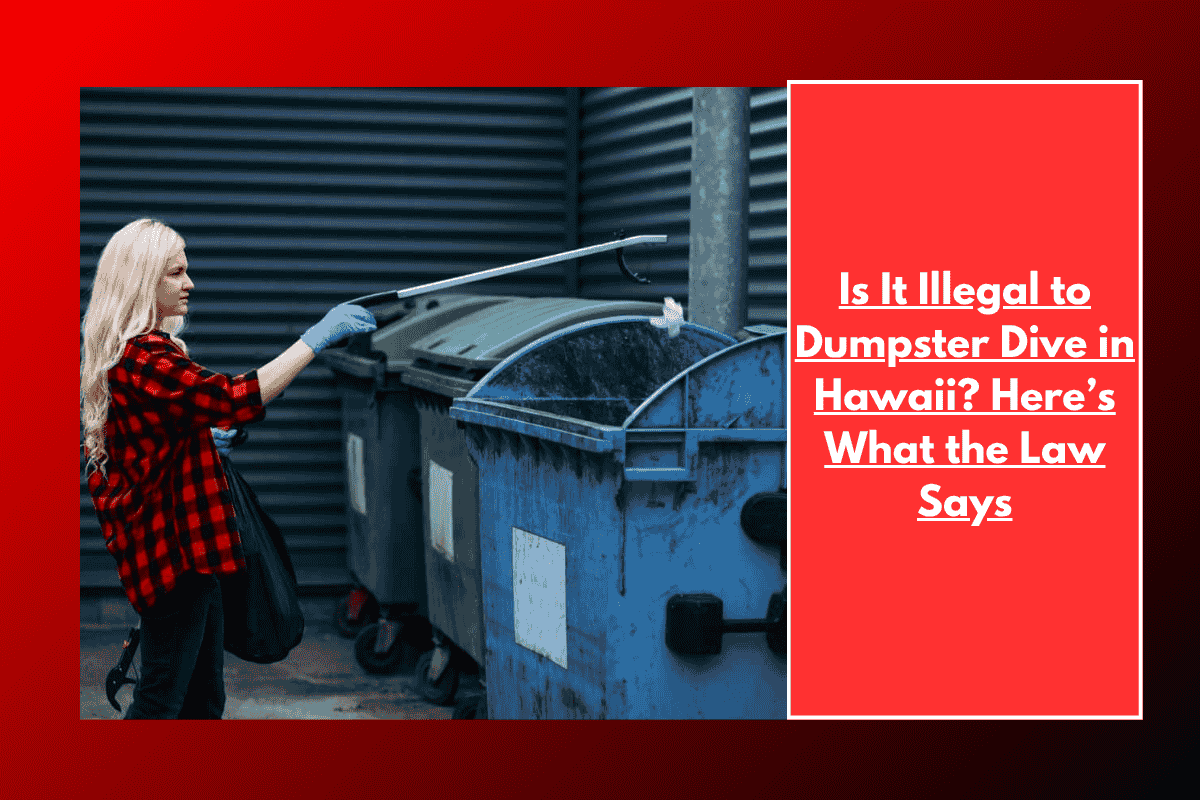Dumpster diving, the practice of retrieving discarded items from commercial or residential dumpsters, is often seen as a way to find free food, furniture, or other usable goods. However, the legality of dumpster diving can vary from state to state, and Hawaii is no exception. If you’re considering dumpster diving in Hawaii, it’s important to understand the laws governing the practice to avoid any potential legal trouble. Here’s what you need to know about the legality of dumpster diving in Hawaii.
Is Dumpster Diving Illegal in Hawaii?
In Hawaii, dumpster diving is generally not illegal by itself, but it can lead to legal issues depending on several factors such as where you’re diving, what you’re retrieving, and how you’re going about it.
Key Legal Considerations
- Trespassing
The most common legal issue with dumpster diving is trespassing. Dumpster diving is often done on private property, and if you enter someone’s property or business without permission, it could be considered trespassing. Trespassing laws in Hawaii are strict, and you can face fines or even arrest if you’re caught on private property without authorization.- Private Property: If the dumpster is located on private property (such as behind a store, restaurant, or residential property), you must have the property owner’s permission to access it. Without permission, you could be cited for trespassing.
- Public Property: If the dumpster is on public property (for example, in a public park or street), dumpster diving may be permitted, but it’s still important to check local regulations.
- Theft
Another issue to be aware of is theft. Some items in dumpsters, such as food or personal belongings, may still be considered the property of the owner until they are officially discarded. Taking items from a dumpster could be viewed as theft, particularly if the items are not clearly abandoned or if the business has specific rules regarding discarded goods. In Hawaii, businesses that discard waste, especially food, may have specific rules about ownership until the items are officially considered trash. It’s important to keep in mind that even though an item is discarded, it may not be legally abandoned. - Littering and Environmental Concerns
Dumpster diving can sometimes lead to unintended consequences such as littering. If, in the process of dumpster diving, you leave trash outside the dumpster or create a mess, you could be cited for littering under Hawaii’s environmental laws. Always make sure to clean up after yourself to avoid littering violations. - Health and Safety Codes
Dumpster diving can also raise concerns about health and safety, particularly when it comes to food. In Hawaii, like in many states, food discarded in dumpsters may no longer meet health and safety standards. If you are retrieving food from a dumpster, it could pose health risks due to contamination or improper handling. While dumpster diving for food is not illegal, consuming food from dumpsters can put you at risk of foodborne illness or injury, and it could be seen as a violation of health and safety codes if it involves a business that sells food.
Hawaii’s Local Regulations on Dumpster Diving
While there is no statewide law specifically prohibiting dumpster diving, individual cities and counties in Hawaii may have their own rules and ordinances regarding waste management, access to dumpsters, and trespassing. For example, some areas may have ordinances that restrict access to commercial dumpsters or impose fines for unauthorized access.
Before dumpster diving in Hawaii, it’s important to:
- Check Local Ordinances: Different counties, like Honolulu or Maui, may have their own rules regarding dumpster diving. Some areas may require permits for accessing certain dumpsters or restrict access to specific types of waste.
- Ask for Permission: If you’re planning to dive in a commercial dumpster, it’s best to ask the business owner for permission. This can help you avoid trespassing charges and build good relationships with local businesses.
What Are the Potential Consequences of Dumpster Diving in Hawaii?
If you are caught dumpster diving in Hawaii without following the rules, you could face:
- Trespassing Charges: If you’re on private property without permission, you could be cited for trespassing.
- Theft Charges: If items in the dumpster are not clearly abandoned, you could be accused of theft.
- Fines for Littering: If you leave trash around the dumpster or don’t clean up after yourself, you could face a fine for littering.
- Health Risks: While not a legal consequence, dumpster diving for food can expose you to serious health risks, especially in areas with warm climates like Hawaii.
Is Dumpster Diving Legal in Hawaii?
Dumpster diving in Hawaii is not outright illegal, but it comes with potential legal risks, particularly if you’re trespassing, stealing, or violating local laws. To avoid trouble, it’s important to:
- Get permission from property owners if you’re on private property.
- Check local ordinances for specific rules regarding dumpsters and waste disposal.
- Be cautious about retrieving food from dumpsters to avoid health and safety risks.
- Always clean up after yourself to avoid littering fines.
By following these guidelines, you can minimize your risk of legal issues while dumpster diving in Hawaii.
SOURCES
[1] https://scrapsafari.com/dumpster-diving-in-hawaii/
[2] https://www.legalmatch.com/law-library/article/is-dumpster-diving-illegal.html
[3] https://worldpopulationreview.com/state-rankings/dumpster-diving-legal-states
[4] https://www.reddit.com/r/DumpsterDiving/comments/1q36ze/is_dumpster_diving_legal_in_your_area_heres_how/
[5] https://www.theenvironmentalblog.org/2025/04/is-dumpster-diving-legal/














